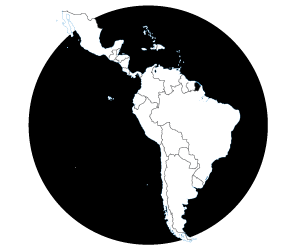We welcome your feedback
Your input matters. Help us improve the CIF website by completing a brief survey. It will only take two minutes and will support our ongoing efforts to serve you better.
The 33 countries of Latin America and the Caribbean account for 8.5 percent of the global population — approaching 665 million people. A significant majority live in urban areas; in fact, this region is the most urbanized in the developing world.
The region’s natural wealth is vast. Nearly 50 percent of the total land area is covered by forest. Containing some of the most species-rich biomes on Earth, it is also home to 50 percent of the world’s biodiversity.
Parts of the region are vitally important as a carbon sink. For example, the Amazon soaks up five percent of all greenhouse gas emissions. At the same time, Brazil and Mexico are amongst the top 20 contributors to global emissions.
The Caribbean is also home to Small Island Developing States (SIDS): they include Jamaica, St. Lucia, and St. Vincent and the Grenadines.

Transitioning to a low-carbon economy offers an opportunity for inclusive development. The changes to production and consumption that need to be made by 2030 to stay on track for full decarbonization by 2050 could create 15 million jobs.
The Climate Investment Funds (CIF) is supporting the ambitious climate change plans that have been set out by multiple countries in the region.
Brazil: The CIF’s Forest Investment Program (FIP) is enabling the protection of the Cerrado — among the largest of the country’s forests. Forty-eight percent has been converted to intensive agricultural use and cattle ranching. FIP’s grants and near-zero interest financing is promoting the sustainable management of the area in order to maintain carbon stocks, reduce deforestation, decrease emissions, and protect forest-dependent Indigenous groups.
SIDS: Funding from CIF’s Clean Technology Fund (CTF) and its Pilot Program for Climate Resilience (PPCR) supports regional, thematic, and country-specific programs across the Caribbean. PPCR is enabling Jamaica and five other Caribbean nations to enhance its climate resilience and disaster- risk management abilities. Priority projects include improving the quality and accessibility of climate information services, conducting information campaigns to increase the uptake of adaptation measures nationwide, and protecting climate-vulnerable livelihoods, such as the country’s fishing sector.
Peru: Forty-five percent of all deforestation has taken place on lands with no legal status. Many forest communities have lost out to agriculture, gold, oil, and gas exploitation. In Peru’s Ucayali region — home to three Indigenous groups and 3.98 million hectares of forest, FIP is helping forest- dependent communities to sustainably manage their landscapes. For native communities, the formal registration of legal land titles is an important project objective.
Chile: CTF is helping Chile overcome its lack of experience in renewable energy and energy efficiency by paving the way for large-scale investment. In particular, concessional financing is helping to de-risk investments in early-stage geothermal development and large-scale solar power, including Chile’s first concentrated solar power plant.
CIF, in partnership with the Government of Jamaica, Inter-American Development Bank (IDB), and World Bank Group (WBG), hosted the “CIF Latin America and the Caribbean (LAC) Knowledge Exchange” from June 23 to 26, 2025 in Kingston, Jamaica. This four-day knowledge event brought to
Your input matters. Help us improve the CIF website by completing a brief survey. It will only take two minutes and will support our ongoing efforts to serve you better.

